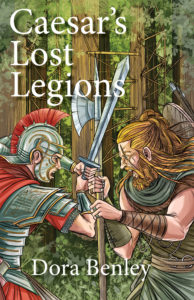Dora Benley Writes Novels About Italian Culture:
We should send notices about the following books to Italian magazines about Italian culture such as Italia Magazine or Italian American.
In Caesar’s Lost Legions Augustus has sent Caelius Antonius to the Roman province of Germania in 9 AD to draw a map to lead the legions as far East as the River Elbe. Caelius awakens to find Thor’s hammer engraved in the tree bark outside his tent. Is that a warning?
In Pliny: A Thriller Pliny the Elder, or Gaius Plinius Secundus, was an ancient Roman scientist, essayist, and thinker, probably the greatest mind of the first century AD. He had an office right next door to what later became the Porta Nigra in Trier.
What was he doing there, hundreds of miles away from his home in Rome? Trier was the oldest Roman city in Germany. He had been appointed Governor of the Province of Germany probably by the Emperor Vespasian and his son, the Emperor Titus. No doubt he studied the birds there as well as the flora and fauna since he was the first to write an encyclopedia called the Natural History, which was influential for centuries.
He was carrying on business as usual here early in the summer of 79AD before packing his bags and returning home for a summer at the seaside south of Rome at one of his villas near the Vesuvius Volcano which unknown to any mortal that summer was about to erupt.
According to legend that is how Pliny died. He was leading an expedition to save those too near the volcano when the volcano sent a rain of ash down upon him. Italian archaeologist now think they may have discovered his remains in a ship in the Bay of Naples near the volcano. See article on the website.
But the novel offers a different explanation for his mysterious disappearance. He was being pursued by German warriors for writing a derisive work about their peoples and culture called the Germania.
But did he escape or not? Pliny: A Thriller may present surprising answers. It is the latest book in the Edward Ware Thrillers at War Series.
In Julia: A Romance Julia has every reason to wish that she had not been born the daughter of a Roman senator during the Roman Civil Wars of Marius and Sulla. Her father, Rufus, is trying to escape the proscription lists and save his life by betrothing his only daughter in marriage to Marcus Sisenna.
Marcus Sisenna is the right hand man of Lucius Cornelius Sulla Felix, one of the leading men of Rome of the day. Rufus needs his armies and the protection both Sulla and Sisenna can provide.
But Julia does not want to marry a man who has already had five wives and who is just marrying her for her father’s money and estates. She does not want to be added to his collection of trophies. Julia wants personal happiness despite the time period into which she has been born. Her father thinks only of keeping his wealth and estates together. Her divorced mother is interested only in her own lovers. To whom shall Julia turn for assistance? The answer may surprise you. For it is obviously just the opposite of what the desperate Julia might expect.
In Carthage Must Be Destroyed Gaius Antonius is inspired by the leading senator and statesman, Marcus Porcius Cato. He turns his talent for drawing into a map making expedition to Carthage where he manages to ferret out a naval vessel as evidence that the Carthaginians are starting to rebuild their fleet in the aftermath of the Second Punic War. They have finished with the reparations that Rome imposed on them, and now have money to spare.
He and his mentor Cato return to the Roman Senate to get them to declare war when the map disappears. Gaius must chase the Carthaginian Princess Tanit across the Mediterranean and meet all sorts of unexpected hardships.
Will he make it in time, or will Princess Tanit and her relatives gain the upper hand against them? Find out in Carthage Must Be Destroyed by Dora Benley.
